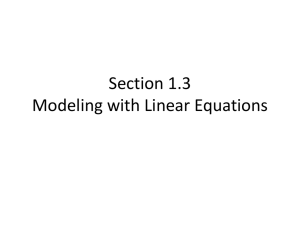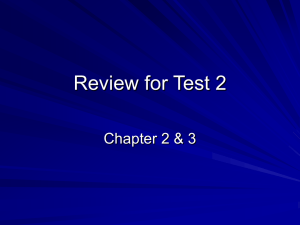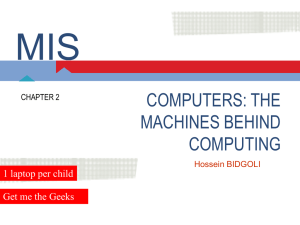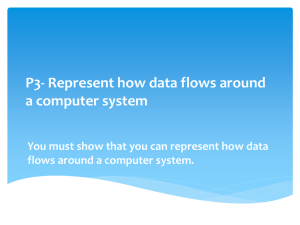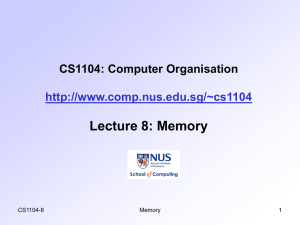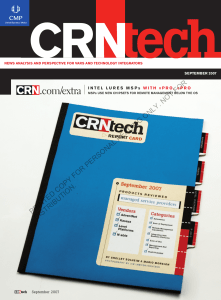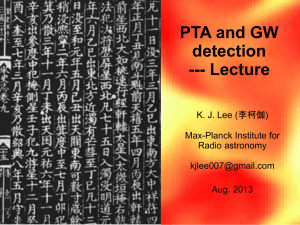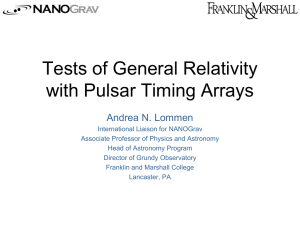Pulsar and Fast Transient Searching with the Parkes telescope
advertisement
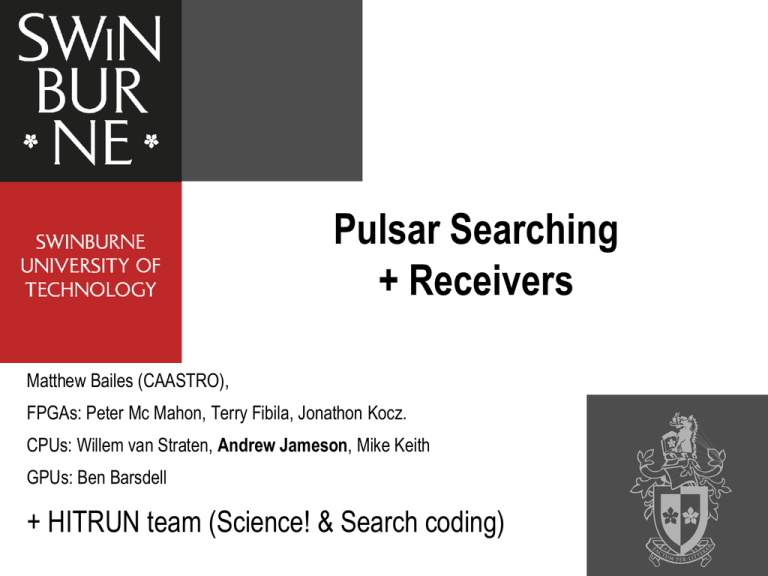
Pulsar Searching
+ Receivers
Matthew Bailes (CAASTRO),
FPGAs: Peter Mc Mahon, Terry Fibila, Jonathon Kocz.
CPUs: Willem van Straten, Andrew Jameson, Mike Keith
GPUs: Ben Barsdell
+ HITRUN team (Science! & Search coding)
Magnetic Field - Period Diagram
Crab pulsar
Pulsars go
this way
“Noisy”
“Smooth”
Vela Pulsar
Competition
Telescope
Point Source
Blind
Survey
FoM
Computational
Complexity
PKS MB
1
1
1
GBT
25x
0.5
0.4
GMRT
1.7x
~1
315x
ASKAP
0.14x
4.25x
400,000x !!!
{RAM=529PB}
PALFA
162x
5.5x
0.5
MeerKAT-64
14.5x
40x
73,000 !! [RAM=351 TB]
PKS WB
PKS PAF
2.25x
0.25x (40K?-20K)
.25x
~1 ~4x
2x
~4x (no acc) ~64x (4x??)
Molonglo 30x1
0.16x
2.8x
0.3x [RAM = 5TB]
SKA 256
300x
650x
73,000 !! [RAM = 21TB]
[RAM = 327 TB]
HITRUN Pulsar Surveys (Keith et al. 2010)
Digital Versions of the Parkes MB Surveys
13 x 1024 x 64 us
Medium-Latitude Survey (540s)
Ultra-deep Survey (4000s)
All-sky Survey (260s)
Better for high-DM MSPs
Better for Lorimer bursts
Better for RRATs
Deeper than old surveys
Berkeley-Parkes-Swinburne-Recorder
“BPSR”
Dedicated fibre
5 TB/day
Bandpasses
MSPs
HITRUN: 27 MSPs
P-ALFA: 15 MSPs?
MSP with a main sequence companion
(PSR J1903+0327)?
FERMI-Related: ~50MSPs
Mostly short-period and many close
GBT Drift 350 MHz: >6 MSPs??
MSP occasionally super-bright
Precision Timing:
PSR J1017-7156
A Jupiter-mass “Planet” Pulsar
Mc~ 0.001 Mo
mp
3
0.463 GPb 2 mp mc
Porb~ 0.0907d
D ~ 1.2 kpc?
MSP Luminosity Function (Levin et al.)
RAW
Cleaned
Barsdell’s Heimdall Real-time RRAT Detector
Barsdell’s Heimdall Real-time RRAT Detector
BAD RFI EXAMPLE
Dan Thornton (U Manchester)
DM >> Lorimer Burst ! Well off galactic plane.
One beam
Only
Instrumentation
Perfect
Allows detailed
studies
In future capable of finding in real time
Heimdall plot of Thornton’s burst.
Burst Profile
~50 sigma
Scatter Tail (nu^-4.0(4)
Freq index -2.000(6)
Search SNR
SNR SPSR
P w
(Trec Tsky )
w
G BtNp
G BtNp P w
PSRFoV
flux
FoM
N
beam
2
(Trec Tsky ) w
2
Computational complexity
2
T
t
2
BN p G
N acc t
2
2
Com plexity B N beam N acc
4
Com plexity N beam
RAM BNbeam t
TPSR flux
4
G
Competition
Telescope
Point Source
Blind
Survey
FoM
Computational
Complexity
PKS MB
1
1
1
GBT
25x
0.5
0.4
GMRT
1.7x
~1
315x
ASKAP
0.14x
4.25x
400,000x !!!
{RAM=529PB}
PALFA
162x
5.5x
0.5
MeerKAT-64
14.5x
40x
73,000 !! [RAM=351 TB]
PKS WB
PKS PAF
2.25x
0.25x (40K?-20K)
.25x
~1 ~4x
2x
~4x (no acc) ~64x (4x??)
Molonglo 30x1
0.16x
2.8x
0.3x [RAM = 5TB]
SKA 256
300x
650x
73,000 !! [RAM = 21TB]
[RAM = 327 TB]
Conclusions
Wideband feed complements the MB:
Good for point sources
Good for follow-ups
Limited RFI excision? Parallel system?
PAF:
Tsys/Aeff critical: 2x MB (marginal) 1x MB (excellent)
MultiBeam:
Currently #1 instrument for PSR and Burst surveys
RFI excision should be mirrored on PAFs?
1909-3744 8s dumps!
Peryton Examples (Burke-Spolaor et al)
Ugly, Fat.
